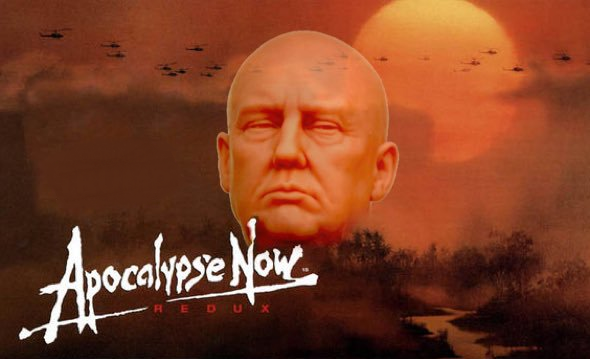REST IN POWER
In Memoriam: H. Bruce Franklin (1934-2024)

The American cultural historian called the creation of the US Space Force an “open declaration of our national insanity.”
This CounterPunch feature, in honor of Professor Franklin who passed away on May 19, 2024, is from a previous discussion with him in 2018 and found in Foreign Policy Journal.
Bruce Franklin is a US academic who specializes in American studies, science fiction, marine ecology, prison literature, and military history. He writes extensively on US wars and American cultural history while strongly advocating for academic freedom in higher education. I asked Franklin to discuss the plan for a military presence in space, the prospects for its Pentagon support, and the likelihood of it becoming “the next battlefield.” I also asked him to break down space militarization as he describes how it already exists as a US capability and explains the meaning of Trump in this reemerging context and the origins of a US “war star.”
Daniel Falcone: I wanted to ask you about the recent headlines regarding Vice President Mike Pence and the announcement of the Space Command branch of the military. What was your general reaction after hearing this announcement?
Bruce Franklin: First, it makes no rational sense. That’s obvious. Our nation is already militarizing space. The Space Force would just add another branch to the bureaucracy of the military, which is already an octopus with too many arms. At a minimum, it would cost billions of dollars just to fund this Force with offices, people, computers, and other goodies. It would be a ridiculous waste of resources and personnel, which are reasons the military honchos oppose it.
But the real concern is that it would be an official declaration of a race to militarize space. It’s as though the people leading our government have learned nothing from the history of our nation and this planet since 1945. Because every single weapon system that we invented and every single move we’ve made to gain military supremacy has succeeded in making us more and more insecure. At the end of World War II, we were the only major power in the world with global military capabilities, with the oceans to the east and west and friendly countries to the north and south. And yet somehow, we’ve succeeded in putting ourselves in daily jeopardy of annihilation and a constant vortex of militarization. And it’s not as though this wasn’t predicted.
After the first successful test of an atomic bomb, Leo Szilard, who initiated the Manhattan Project, together with 68 other scientists from the Manhattan Project, signed a letter to the president urging him not to use this weapon and warning about the future that would come. ‘Don’t use this bomb. If you use this bomb, eventually: “the cities of the United States would be in continuous danger of sudden annihilation. So, it was totally predictable. The consequences of a military race in space are just as predictable. Russia and China right away are going to try to match whatever we do in the weaponization and militarization of space. And then other countries are going to get the technology and the infrastructure to be able to put up all kinds of very dangerous weapons and systems in space. Back in 1945 there was a great article titled, “Gentlemen, you are Mad!” What we did then and ever since is indeed mad and insane. I not only witnessed but also participated in this insanity as a navigator and intelligence officer in the Strategic Air Command in the 1950s.
Daniel Falcone: Can you take a moment to discuss US weapons capabilities and could you compare the Obama Doctrine to the Trump “Me First” foreign policy on this score? Also, could you explain what a “war star” is—in the historiography of the United States from your standpoint? How is Trump a “war star?”
Bruce Franklin: Yes, and why I wrote a book titled — not Star Wars, but War Stars. The title refers to things we have created and men who created and glamorized them. We have created literally war stars. Our thermonuclear weapons are literally miniature stars, hence war stars. They work the same way that the sun works. We’ve harnessed that and done it in a way that puts our species in jeopardy. When I taught a nuclear war class, I told the students, ‘I was born and grew up on a different planet from the one on which you were born and grew up.’ On that planet, there was nothing that threatened the existence of our species. Now there is. We homo sapiens think we are smart. We’re so smart that we’ve created the means of our own extinction. And not only created that means but deployed it and threatened to use it. And have come very close to using it many times. So that’s the first meaning of “war stars,” the physical stars.
Secondly, there are the human stars. In the book, War Stars – the concept dates all the way back to the 18th century when Robert Fulton created what he thought would be the ultimate defensive weapon, that would bring an end to wars, one that would never be able to be used as an offensive weapon. That was the submarine, the war submarine. And now, here we are in the 21st century when US submarines, Russian submarines, British submarines, and Chinese submarines are roaming the oceans armed with nuclear missiles. Our submarines have 124 thermonuclear warheads, each many times more potent than the atomic bombs that incinerated Hiroshima and Nagasaki.
These thermonuclear weapon heads can be launched from underwater. And the three top officers on each of these submarines have the physical power and the authority to launch those weapons. The Russian submarines off our coast have the same power and authority. The first human “war star” then can be traced back to Fulton. Other historically noteworthy “war stars” include Thomas Edison; Billy Mitchell, the ‘father’ of the US Air Force; my former boss, Curtis LeMay; Harry Truman, who bombed Hiroshima and Nagasaki; and every other US president since. As many people have been pointing out for decades, it’s not as though the last time we used nuclear weapons was in August in 1945. We’ve continued to use them, the same way a person uses a weapon when they put a gun to your head and say, ‘Give me your wallet.’ We offered nuclear weapons to the French in 1954.
It’s every single American President without exception and having someone unstable as our current president [Trump] makes it scarier. But most Americans are still under the illusion that only the president can order a nuclear attack, which is simply false. The ability to order nuclear attack is widely dispersed. If people thought about it, they would realize it has to be that way in order to maintain “effective deterrence.”
‘We must have the ability and authority to launch nuclear weapons widely’ because otherwise another power could conduct a decapitating first strike, in which one nuclear bomb would wipe out the President, the Vice President, everybody in the Pentagon, the entire Washington area and all the people in the chain of command. This is why the commanding officers of the nuclear submarines, and many other branches have nuclear weapons available.
I worry about those people in the nuclear subs and the people with the tactical nukes almost on the Russian border and a full-scale race to militarize and weaponized space is beyond scary. It’s hard here to see much difference between Obama and Trump. Obama decided to “modernize” and “update” our nuclear arsenal. Of course, Trump has special claims and ambitions as a war star. He is already a star, and his stardom led to the White House. And “war” is something he wages with glee, whereas the trade wars that he claims are “good” and “easy to win,” or the land, air, and drone wars America is now fighting in at least seven countries. Then there are [Trump’s] hair-raising and bone-chilling threats against North Korea: “I too have a Nuclear Button, but it is a much bigger & more powerful one than his, and my button works!”
Daniel Falcone: With Pence making this announcement and the rhetoric that’s used by Trump in regards to the militarization of space, what do you think is taking place on an American historical level as far as the domestic population being potential proponents of this? Is the US population and its cultural imagination and fascination with the super weapon embraced or feared, and where does it originate?
Bruce Franklin: Obviously our culture has been deeply influenced by science-fiction, which is seen in contradictory ways, on the one hand glorifying and romanticizing it, and on the other hand, warning against the terrifying aspects of it, but it’s a given in the culture. Unfortunately, it is also a given in the culture, that there’s nothing we can do about it, which is probably the most dangerous idea of all.
If this military concept is supported it makes me think that the country is very susceptible to fear and propaganda. I’m trying to get to the causes of that, when it comes to war and selling war, how these new dimensions of explaining threats get people to accept the narrative and reality of each geo-political situation. American exceptionalism didn’t begin yesterday or with Trump. It has a very long history which we can trace back to the 17th century and those Puritans who believed that God had given a special mission. In general, American ignorance of modern history is monumental, and very scary. I think that very few Americans have any notion of how isolated we are in the world in our attitude toward weapons, militarization, and war. And it’s brought right into focus on this issue of space.
In 2014 there were two resolutions brought before the UN on the prevention of an arms race in space. 178 nations voted for that resolution to prevent militarization and an arms race in space. Two nations abstained: the United States and Israel. In a second resolution there were 126 nations that voted for it, while the United States and Israel voted against it, joined by Georgia and Ukraine (the Ukraine after the coup that overthrew the legitimate government of Ukraine and installed this neo-fascist government). Sane people recognize that if space is to belong to anybody it must belong to everybody. The creation of the US Space Force would be an open declaration of our national insanity.



